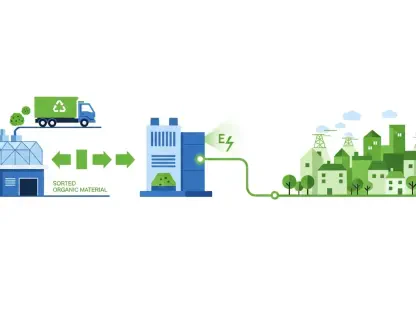In a striking display of resistance against federal policy shifts, New York Attorney General Letitia James has rallied a formidable coalition of state attorneys general, cities, and counties to confront the U.S. Environmental Protection Agency’s (EPA) troubling proposal to rescind the 2009 Endangerment Finding. This crucial determination identified greenhouse gas emissions as a direct threat to public health and welfare, forming the foundation of federal climate regulations under the Clean Air Act. The coalition’s opposition transcends mere policy disagreement; it represents a desperate stand to shield communities from the intensifying perils of climate change, which are already manifesting in devastating ways across the nation. From rising extreme weather events to alarming health statistics, the stakes could not be higher. This battle is about safeguarding the environment, upholding scientific integrity, and ensuring that the well-being of future generations is not sacrificed for short-term political gains.
Challenging a Dangerous Policy Reversal
The EPA’s proposal to undo the Endangerment Finding threatens to dismantle essential protections that limit greenhouse gas emissions, striking at the heart of national efforts to address climate change. Attorney General James, alongside her allies, contends that such a rollback is not only a reckless decision but also a clear violation of established law. This move flies in the face of Supreme Court rulings and disregards the vast body of scientific evidence affirming the dangers of unchecked emissions. In New York State alone, the frequency of billion-dollar climate disasters has surged dramatically over recent decades, while New York City reports an average of over 500 heat-related deaths each year. These stark realities underscore the urgency of maintaining robust regulations. The coalition argues that abandoning this finding would betray the EPA’s fundamental duty under the Clean Air Act to protect public health and the environment from known pollutants.
Beyond the legal and scientific objections, the broader implications of this policy shift are deeply concerning for state and local leaders. Rescinding the Endangerment Finding would effectively cripple federal authority to regulate emissions across multiple sectors, leaving states to bear the burden of climate impacts without adequate support. The coalition emphasizes that this is not a distant threat but a current crisis, with communities already grappling with floods, wildfires, and extreme heat. The potential reversal would also set a dangerous precedent, signaling that political motives can override evidence-based policymaking. For many in the coalition, this fight is about preserving the integrity of environmental governance and ensuring that federal agencies remain accountable to the public they serve. The resolve to challenge this proposal reflects a shared commitment to confront climate change head-on, rather than retreat from hard-won progress.
Health and Economic Consequences of Inaction
The coalition led by Attorney General James has raised urgent warnings about the severe health repercussions that could follow if the EPA’s proposal moves forward. Without stringent regulations on greenhouse gases, conditions such as asthma, heart disease, and other respiratory ailments are expected to spike, disproportionately harming vulnerable populations like children, the elderly, and low-income groups. These communities often lack the resources to cope with worsening air quality or extreme weather events, amplifying the human cost of policy rollbacks. Workers exposed to outdoor conditions would also face heightened risks, with heat stress and related illnesses becoming more common. The coalition points to compelling data showing that maintaining current protections is not just a moral imperative but a public health necessity to prevent unnecessary suffering and premature deaths across the nation.
Economically, the fallout from rescinding key emissions standards, particularly for motor vehicles, could be catastrophic. Projections suggest that abandoning these standards would result in over eight billion metric tons of additional carbon dioxide-equivalent emissions over the next three decades, contributing to climate damages estimated at $1.82 trillion. Such staggering costs would burden future generations with environmental and financial challenges that could have been mitigated through proactive policy. The coalition argues that these figures are not mere speculation but are grounded in rigorous analysis, highlighting the intertwined nature of environmental and economic stability. For industries like automotive manufacturing, failing to uphold emissions standards could also erode competitive advantage in global markets increasingly focused on sustainable, low-emission technologies, further compounding the economic risks of inaction.
Scrutinizing the Foundation of the EPA’s Proposal
Central to the EPA’s justification for rescinding the Endangerment Finding is a Department of Energy (DOE) report that the coalition deems fundamentally flawed. Compiled in less than two months by individuals known for skepticism toward climate science, the report lacks peer review and fails to adhere to federal standards of scientific integrity. Critics within the coalition argue that it blatantly misrepresents decades of established, peer-reviewed research on climate change, instead advancing a narrative driven by political bias rather than evidence. This lack of rigor not only undermines the credibility of the EPA’s proposal but also violates legal frameworks like the Federal Advisory Committee Act, which mandates transparency and accountability in such processes. The coalition has called for the report’s immediate withdrawal, viewing it as an unacceptable basis for dismantling critical environmental protections.
The broader implications of relying on such a questionable document are alarming for environmental policy experts and advocates alike. By sidelining credible science, the EPA risks eroding public trust in federal decision-making at a time when climate action is more urgent than ever. The coalition stresses that this is not merely a procedural issue but a profound ethical failing, as it disregards the overwhelming consensus on the dangers of greenhouse gas emissions. Their legal challenges, including detailed comment letters, aim to expose these shortcomings and demand a return to evidence-based governance. The fight over this report is emblematic of a larger struggle to ensure that policy reflects reality rather than ideology, with state leaders stepping in to defend the scientific foundation of climate regulations against what they see as deliberate distortion by federal entities.
Building a Coalition for Environmental Justice
Attorney General James has galvanized a diverse and powerful alliance, comprising attorneys general from 21 states, the District of Columbia, and representatives from major cities and counties, to counter the EPA’s proposed rollback. Their unified legal actions, including submitting comment letters and filing an amicus brief, demonstrate a resolute commitment to defending science and public welfare. This coalition is not merely reacting to a single policy but is actively working to hold federal agencies accountable to their legal obligations under the Clean Air Act. Their efforts reflect a broader movement among state and local leaders to resist federal attempts to weaken climate protections, emphasizing that environmental justice must remain a priority. The geographic and political diversity of this group amplifies the message that climate change is a shared crisis demanding collective action.
This unified front also serves as a reminder of the critical role state and local governments play in filling gaps left by federal inaction. By leveraging their legal authority and public platforms, these leaders aim to protect communities most at risk from the consequences of climate change, such as intensified storms, flooding, and heatwaves. The coalition’s actions are rooted in a deep understanding that vulnerable populations often bear the brunt of environmental degradation, and their advocacy seeks to address these inequities head-on. As they push back against the EPA, their work highlights a growing trend of decentralized resistance, where states and municipalities take the lead in safeguarding public health and the environment. This movement underscores a determination to uphold climate policies that align with both scientific evidence and the urgent needs of the public.
Reflecting on a Pivotal Stand
Looking back, the efforts spearheaded by Attorney General James and her coalition marked a defining moment in the struggle to preserve climate protections against federal rollbacks. Their legal challenges and public advocacy shone a spotlight on the profound risks posed by the EPA’s attempt to rescind the Endangerment Finding, from escalating health crises to massive economic losses. Moving forward, the focus must shift to strengthening state-level initiatives and fostering collaboration across regions to counteract any gaps in federal policy. Encouraging innovation in sustainable technologies and reinforcing emissions standards will be vital steps to mitigate future climate impacts. Additionally, ensuring that scientific integrity remains at the core of environmental governance will help rebuild trust in public institutions. This historic resistance serves as a blueprint for how collective action can drive meaningful change, offering hope that sustained efforts can secure a healthier, more resilient future for all.









